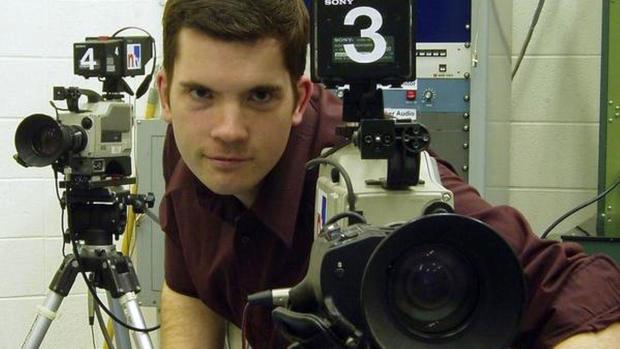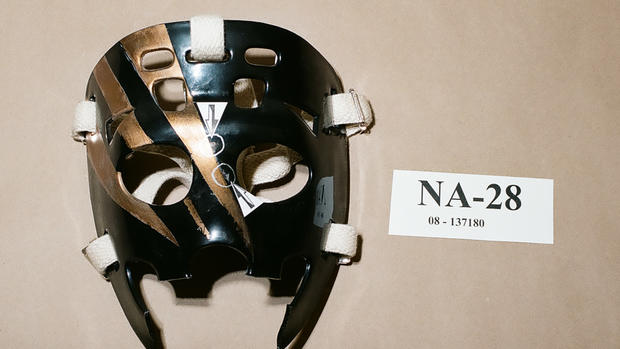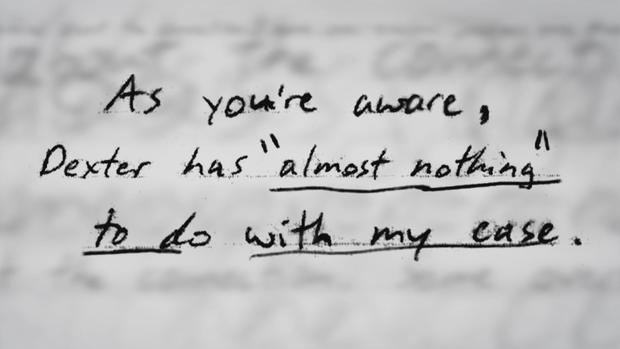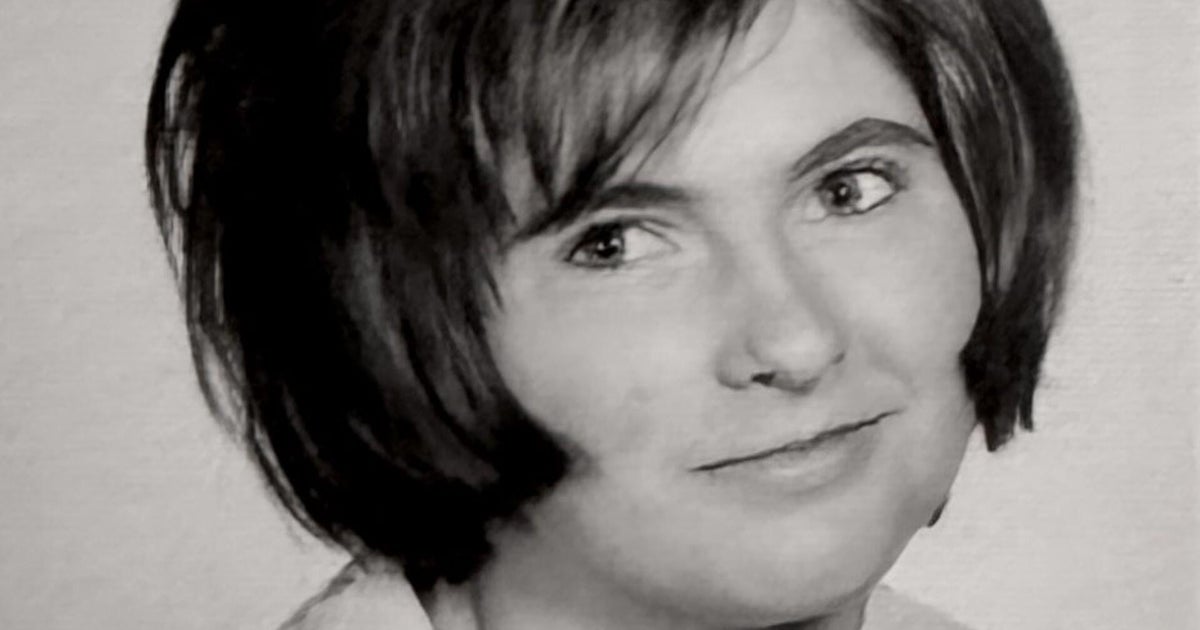Inside the mind of Mark Twitchell, "The Dexter Killer"
When investigative journalist and MacEwan University Professor Steve Lillebuen set out to write a book about the Dexter-obsessed murderer Mark Twitchell in late 2010, the last thing he expected was to get a jailhouse call from the killer himself.
"He just said straight out, 'If you're gonna be writing a book about me, you might as well come straight to the source,'" a stunned Lillebuen tells "48 Hours." That call set in motion a correspondence with the would-be serial killer that lasted for almost three years. Now, "48 Hours" contributor Troy Roberts reports on those letters and gets a revealing look at what one retired FBI criminal profiler believes motivated Mark Twitchell in "The Dexter Killer," now streaming on Paramount+.
"He wrote me probably 30 or 35 different letters — up to about 350 pages ... like an entire book worth," Lillebuen, the author of "The Devil's Cinema: The Untold Story Behind Mark Twitchell's Kill Room" tells "48 Hours." "He's very self-aware, and he has this sort of this obsessive-compulsive nature to want to write everything down ... I'd ask him one question … and I'd get 10 pages back as an answer."
In 2008, Twitchell was a 29-year-old aspiring filmmaker living in Edmonton, Canada, with his wife and young daughter. While outwardly unimposing, his writings were dark. They revealed his fascination with the fictional character Dexter Morgan — an obsession that Lillebeun and police say Twitchell carried over into his real-life crimes.
"If you look at the evidence," Lillebuen tells Roberts, "there's significant links to Dexter. … He had a kill room set up with plastic sheeting. He had a table set up for his victims. He had this kind of processing kit that was very similar to what Dexter uses."
After his arrest on Halloween day in 2008, police recovered a deleted file on Twitchell's computer called "SK Confessions." While the filmmaker claimed this document was a screenplay, prosecutors successfully argued that "SK" stood for "Serial Killer," and that the document was actually Twitchell detailing his crimes. In it he writes, "I diligently set up my kill room," explaining how it included "several rolls of painters plastic sheeting" and "a forty five gallon steel drum… for the body parts" as well as a "game processing kit… which contained a butcher knife… a fillet knife… and a serrated saw for the bones."
All of these are items the police would later discover at the crime scene. And while Twitchell claims in this document that he didn't "copy-cat the style of Dexter Morgan," he adds "I'd still like to pay homage to the character."
In October 2008, Twitchell posed as a woman on an online dating site and lured an unsuspecting 38-year-old man named Johnny Altinger to a garage. Twitchell spent time turning the garage into a "kill room" before brutally beating and stabbing Altinger to death, after which he placed his body on a table and methodically dismembered him — all actions eerily reminiscent of the fictional Dexter character himself.
And yet, in a letter to Lillebuen, Twitchell writes, "As you're aware, Dexter has 'almost nothing' to do with my case. It has no bearing whatsoever on what actually happened."
Lillibuen tells Roberts, "No one's saying the people who created Dexter are to blame for a real-life death. That's ridiculous." But Lillibuen says Twitchell "completely denies that there's any connection at all," adding, "there's a logical disconnect there."
In his letters, the convicted killer also claims that he killed Johnny Altinger not in an act of cold-blooded murder, but in self-defense. At the time of his arrest, Twitchell had been working on a film called "House of Cards," in which an unsuspecting man gets lured to a garage and killed. The plan, Twitchell argued in court, was to lure men who thought they were showing up for a date with a woman and then attack them, only to then let them escape — so that when his film came out those men would come forward and say this had actually happened to them, thereby creating a buzz. At his trial, Twitchell claimed Altinger became enraged at being tricked and attacked him. It was a premise as fictional as Johnny Altinger's murder was real, and one the jury didn't buy.
Three months after his conviction in 2011 for first-degree murder, Twitchell made the same argument to Lillebuen, writing "I killed Johnny Altinger in a horrific accident of self defense. … Why did he have to react? Why couldn't he just storm off like he was supposed to?" According to Lillebuen, "he's still … pushing that narrative … He still blames Johnny for what happened." Lillebuen tells "48 Hours" that Twitchell is still "trying to argue … that he is innocent. And to be frank, he's — he's wrong."
"The thing I find interesting about Mark Twitchell is that he may know that he hasn't fooled people regarding the fact that he killed Johnny," says retired FBI criminal profiler Julia Cowley. "What he thinks he's fooled everyone is the reason, the true reasons he … killed Johnny." Cowley believes those reasons lie in Twitchell's own writings, particularly in "SK Confessions" and the letters the killer sent to Steve Lillebuen, which she analyzed for "48 Hours."
"I think his primary motive was sexual," Cowley tells "48 Hours." "If we … look at the case as a whole, what does he do? He goes onto online dating websites. He lures men who think they're going to be arriving for a date. ... It's almost as if Mark Twitchell is also preparing for a date. He talks extensively … about preparing the room, what he's going to wear, the weapon that he chooses. He… describes it in seductive language." To make her point, Cowley read from the Twitchell's "SK Confessions": "I wanted the weapon used for the deed itself to be simple, elegant, and beautiful."
Cowley says, "So to him, this is a date. This is something he's been fantasizing about." She argues that for Twitchell this is also a "thrill killing." She adds, "I don't think he thinks anything is wrong with him … I think he's self-aware and understands 'I don't have empathy or sympathy like … other people.'"
In a letter from July 2011 Twitchell writes to Lillibuen trying to explain himself: "There is no ... root cause … no school bully or impressionably gory movies or video game violence or ... Showtime television series to point the finger at. It is what it is and I am what I am."
In another exchange, Twitchell expressed dismay over the outrage his case caused. He complains, "I find the whole thing highly hypocritical. ... There's something obtuse about someone taking a savage glee in watching psychotics brutally murder dozens of people on T.V. and then suddenly playing as thought their stomach is turning inside out when this happens under totally unique circumstances in a real-life, isolated incident."
In another letter to Lillebuen in which he expounds on Dexter's character and mass appeal, Twitchell writes, "Dexter, don't forget, is a monster. A self-aware one no less."
Some would argue that the same could be said of Twitchell himself.






